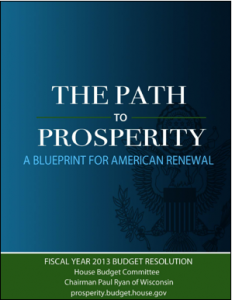
By his own numbers, the only time the budget would even be cut is in 2013 and 2014, and then by $94 billion and $54 billion. After that, spending would increase every single year under a new baseline.
A rather modest proposal, considering the current fiscal predicament the nation is in, where the $15.57 trillion national debt is now larger than the entire economy.
That has not prevented critics from blasting the Ryan proposal as being too austere. For example the Washington Post’s Ezra Klein charges that his deficit reduction plan targets the poor.
Klein complains about cuts to so-called “mandatory” programs, which under Ryan’s budget are reduced by $100 billion — less than 3 percent of the total present budget — over the next five years.
That’s really not that much. One could find more cuts than that in those types of programs without looking too hard.
For example, returning to just 26 weeks of unemployment benefits would save $80 billion. Going back to 2008 spending levels on Medicaid and food stamps would save $75 billion and $40 billion respectively. Eliminating the earned income and making work pay tax credits would save another $64 billion.
All together, that’s over $260 billion of cuts that could be enacted in a single year without severely disrupting much of anything. These were, after all, spending levels everyone was comfortable with just 3 years ago.
In fact, one could go even further to address the seemingly insurmountable fiscal situation we face. But to do so, we muster the political will that presently is sorely lacking — and may remain so until we face a severe crisis.
We must not wait for a debt apocalypse to act. Presently, the sustainability of our fiscal trajectory depends almost entirely on the U.S. dollar’s status as the world’s reserve currency, and our central bank’s ability to monetize the debt.
Particularly the sale of oil and other commodities primarily in dollars creates a high demand for our currency, leading to lower borrowing costs.
As for printing money to refinance the debt, the Federal Reserve now holds $1.66 trillion of U.S. treasuries. Its heavy hand in the bond market, along with relative risks overseas, have further pushed down borrowing costs. 10-year treasuries have reached records lows of about 2 percent this year.
But such a situation can only be temporary. Long before 2040, the dollar may lose its special status, leading to catastrophic increases in borrowing costs as demand for dollar-denominated assets like treasuries plummets. This would in turn place additional pressure on the Fed to monetize the debt, which coupled with the run on the dollar, would lead to crippling inflation.
The government does not expect interest rates to remain low forever. According to data from the Office of Management and Budget, gross interest costs on the debt, including such payments to the Social Security and Medicare trust funds, could rise to over $1.2 trillion a year by 2022 under the current baseline scenario where 10-year treasuries rise to 5.3 percent.
After that, they’ll go even higher, leading to difficulty with even refinancing the debt, let alone ever repaying it. That is exact the situation Greece and other troubled sovereigns across the Atlantic presently find themselves in. It is untenable. If we cannot change course, we are on a path to certain default — long before 2040.
The trouble with the Ryan budget is not that it’s too austere, but that it does not cut spending by nearly enough. Simply put, if we cannot figure out a way to balance the budget and begin paying off the debt incrementally sometime in the near future, a European-style debt crisis may be right around the corner.
Robert Romano is the Senior Editor of Americans for Limited Government.







